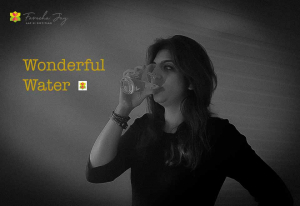WONDERFUL WATER
WONDERFUL WATER
Author
Fareeha Jay
1st October 2019
We all know that we should be having water. Water is required to regulate our body’s temperature and it removes wastes from our body. Water transports nutrients all around our body and is needed as a shock absorber in joints. Usually we tend to forget having water in winters as in summers we are drinking lots anyway because of the heat. Winters is the time where we must put some extra effort to have enough water.
How Much Water Is Enough?
It depends on things like your weight, physical activity, weather but in general we say around 8 to 10 glasses a day. Surely you will need more if there is excessive heat or you have exerted yourself physically.
Aim to have 8-10 glasses a day but listen to your body if you need more.
Will water speed up my metabolism?
Increasing water intake will not speed up your metabolism though not having enough water can slow down your metabolism. When you are not having enough water, the cells in your body become dehydrated, slowing down your body.
Therefore, it’s an absolute must to keep a track on your water intake. Remember only exercise can speed up your metabolism.
Are You Really Hungry?
Many times, we confuse thirst with hunger. When you feel hungry first have a glass of water. Many times, you will realise that you were not hungry after all and it was just you being thirsty and not realising it.
Can I lose Weight with Water?
Having water makes you feel full and you end up eating less. When you eat less you lose weight. So, it will be a great idea to have a glass of water before you have your meal.
Will I lose Weight with Warm Water?
There is no evidence to support this statement. The only explanation for weight loss can be that hot water stays in your stomach for longer and cold water is absorbed quicker, so having a cup of hot/ warm water could help you feel full.
There is no evidence to suggest that you gain weight with cold water.
My tip will be to have water as how you prefer to have it. Warm or cold doesn’t matter, what matters is you should be having it.
Is water the only source of hydration?
Water is not the only way to stay hydrated. 20% of our hydration can come from fruit and vegetables.
Fruits and vegetables will keep you hydrated, while also provide you with nutrients.
Some vegetables high in water are cucumbers, lettuce, radish, tomatoes, peppers, cauliflower, all types of melons, spinach, berries, broccoli and all citrus fruits.
One more reason for you to have more fruit and veg!!
Water and Mealtimes
Having water before a meal will help you feel full, and you’ll end up eating less. Taking occasional small sips of water during your meal will help in making the food soft and easier to digest. It won’t be a great idea to have water immediately after your meal as it will make you bloated. You should be fine to have water after half an hour or when you feel you are ready to have water.
My Own Experience of Increasing Water Intake
I must admit I have never been good with my water intake and it’s a conscious effort I have to make to have water. Recently I have increased my intake and can see visible difference in my skin. I feel less tired, no headaches and feel fresh. Though the only down fall is that I need to rush to the loo all the time!
ABOUT FAREEHA
I am Fareeha Jay, a registered Dietitian. I have a passion and desire to spread knowledge and awareness about healthy eating and lifestyle. The information I provide is based on scientific evidence but explained in a very non-scientific way. I want to break the myths around diet and food. I never want to give diet plans rather I want to empower people on their food and lifestyle choices, so that people can make their own diet plans for the rest of their lives.



Great effort to show love from humen being.
❤️
absolutely love this article ,very informative
❤️
U r such a good teacher
I have learned alot frm you n hoping to continue learning
N yes I also have started to increase my water intake but same problem as urs need to rush again n again
All the best wishes to you n ur team ❤️
❤️